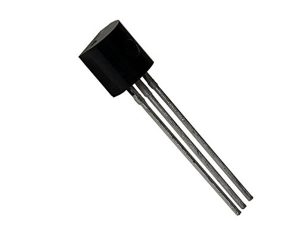 In the world of guitar pedals (and electronics in general), transistors are made from one of two materials: silicon and germanium. There’s a difference between these two materials and how they affect what a guitar pedal does, and it’s important to use the right kind of transistor in guitar pedal builds if you want to get the best sound out of your pedal.
In the world of guitar pedals (and electronics in general), transistors are made from one of two materials: silicon and germanium. There’s a difference between these two materials and how they affect what a guitar pedal does, and it’s important to use the right kind of transistor in guitar pedal builds if you want to get the best sound out of your pedal.
Before jumping into this topic, I have plenty of background information if you need it. You can likely understand how silicon and germanium transistors behave differently without the background, but if you want a deeper dive into the inner workings of transistors, you may be interested. In this article, I’ll be talking a lot about transistors (obviously), so my guide to transistors in guitar pedals may be useful. If you want to go even deeper than that, learn about what transistor hFE is.
All in all, I find transistors really fascinating. They all “do the same thing” in that they amplify a signal, but they can also cause some really cool clipping when they hit their saturation region. What’s really interesting is that, depending on the transistor, the way the signal clips and how that clipping sounds can be drastically different. While the differences are pretty vast between silicon and germanium transistors, there can still be some big differences in the sound of two different models of silicon or germanium transistors.
A Brief History Of Transistors
The first working transistor was created in 1947, but the concept goes all the way back to the 1920’s. These early transistors were made with germanium wafers rather than silicon.
The general story goes, according to University Wafer, that transistors were first pioneered by the military to replace large, heavy, and fragile vacuum tubes in electronics; particularly for use in radar. Obviously the military wanted smaller electronics that were also more powerful, so trying to develop technology that allowed that was a big goal of theirs, especially during World War 2.
After the war, transistor technology became to civilians and people started researching transistor use outside of military applications. This lead to the discovery that silicon not only worked just as well (and better in some applications), it was also a lot less expensive. Overall, silicon transistors are seen as superior because they’re easy and less expensive to produce, more stable, and have less leakage.
That’s all when transistors are working as a basic amplifier. If you want to saturate a transistor and make it make noises that normal people try to avoid, some of the properties of germanium transistors can be quite good.
Silicon And Germanium Transistors In Guitar Pedals
Since germanium transistors were more common in the technology’s early days, most of the original guitar pedal circuits from the 1960’s used these devices. Silicon transistors were invented in the 1950’s, but for a long time silicon wasn’t seen as good and, even once silicon transistors began to surpass germanium, both were readily available.
Since germanium transistors are the “traditional” choice for guitar pedals, especially when we’re talking about fuzz pedals like the Vox Tone Bender, you’ll find they give a more vintage sound. Meanwhile, as germanium transistors became less and less common and more and more difficult to obtain, a lot of builders moved to silicon transistors, creating pedals with a more modern sound.
What Germanium Transistors Sound Like In Guitar Pedals
As mentioned, germanium has a more vintage sound to it. Germanium transistors tend to leak current and can be more temperamental and imperfect. Although this means they may not have as much gain, they still sound great.
Overall, when people are describing germanium transistor clipping, they often use the term “organic.” Germanium transistor clipping, at least to me, often sounds tighter and less crunchy. All in all, it’s more akin to the natural breakup of a vacuum tube.
The big thing about germanium transistors being temperamental is that they’re also unpredictable. This leads to their warmth and organic tone and generally dynamic nature.
What Silicon Transistors Sound Like In Guitar Pedals
Silicon transistors, on the other hand, are much more predictable and reliable. This reliability can be good, but it comes at a cost. Silicon transistors work on wider frequencies and can have a wider fuzz sound to them when they clip. This is a fuzzier fuzz that’s great for very broken up sounds.
Silicon transistors are also able to obtain much higher gain than germanium transistors. This allows them to make things go loud! Or just really amplify a signal. What this means is that if you’re just using a silicon transistor as an amplifier rather than for clipping, you can get some great signal boosts out of it. This can be great to just get more volume or for a basic high gain distortion or overdrive circuit with tons of crunch.
Germanium And Silicon in Transistors Today
These days, to my knowledge at least, no one is making germanium transistors anymore. I’ve seen on a couple forums that there may be a couple companies still making germanium transistors, but they’re for specialist use and aren’t worth the price or hassle for guitar pedals.
Instead, for those who want or need germanium transistors, your best bet is to buy new old stock that somebody has found in a warehouse somewhere. Alternatively, a lot of builders find old electronics and will harvest old transistors out of them.
Meanwhile, there are plenty of modern guitar pedal circuits that use silicon transistors and sound great. Others still are trying to adapt old circuits to work and sound well with silicon.
Because of this, germanium transistors, whether recycled or new old stock, tend to be relatively expensive. Something that you can get for around $1.00 from a regular electronics supplier will cost about $10.00 on eBay. It will hardly break the bank, but it’s a big price difference!
My advice is that if you’re a beginner, stick with builds that only require silicon transistors. There are plenty of great beginner DIY guitar pedal builds out there that only require silicon. My list of easy build does contain the original Tone Bender circuit, which requires germanium transistors, but it’s something to work up to! And once you work up to it, sourcing these obscure parts becomes another fun part of the hobby.
Related posts:
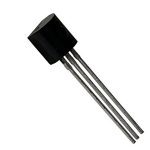 Ultimate Guide To Transistors In Guitar Pedals: What They Do And How They Work
Ultimate Guide To Transistors In Guitar Pedals: What They Do And How They Work
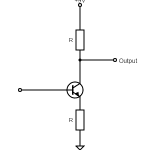 What Is Transistor hFE?
What Is Transistor hFE?
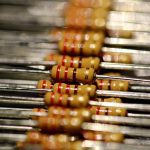 Ultimate Guide To Resistors In Guitar Pedals: What They Do And How They Work
Ultimate Guide To Resistors In Guitar Pedals: What They Do And How They Work
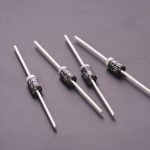 Ultimate Guide To Diodes In Guitar Pedals: What They Do And How They Work
Ultimate Guide To Diodes In Guitar Pedals: What They Do And How They Work
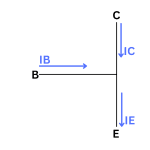 Transistor Saturation, Active, And Cutoff Region
Transistor Saturation, Active, And Cutoff Region
 What Is Gain (And How It’s Different From Volume)
What Is Gain (And How It’s Different From Volume)
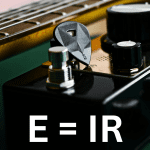 Ohm’s Law: Explanation And Applications
Ohm’s Law: Explanation And Applications
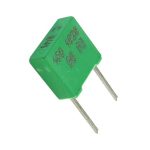 Ultimate Guide To Capacitors In Guitar Pedals: What They Do And How They Work
Ultimate Guide To Capacitors In Guitar Pedals: What They Do And How They Work
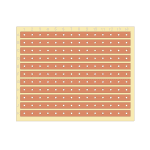 What Is Stripboard And How Do You Read Layouts?
What Is Stripboard And How Do You Read Layouts?
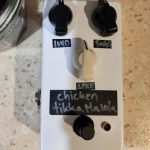 How Do Guitar Pedal (And Guitar) Volume Knobs Work?
How Do Guitar Pedal (And Guitar) Volume Knobs Work?

